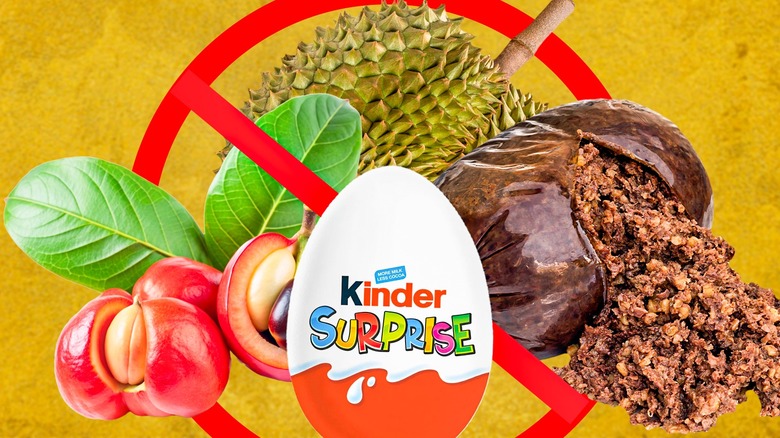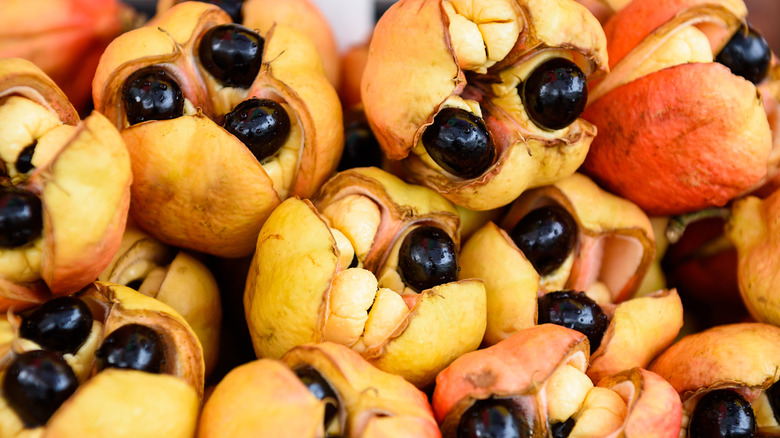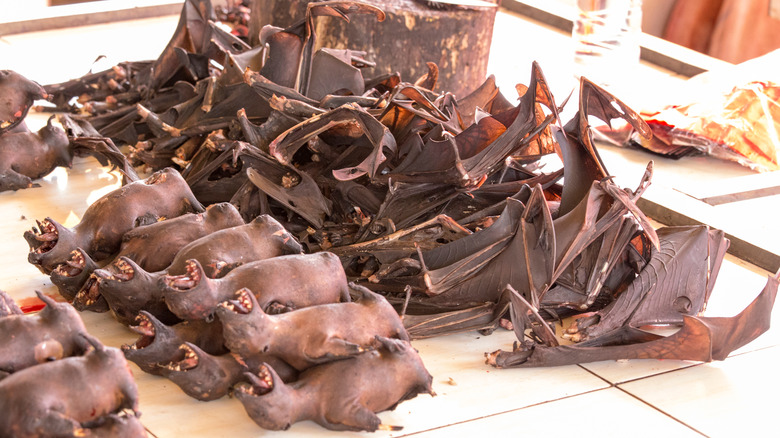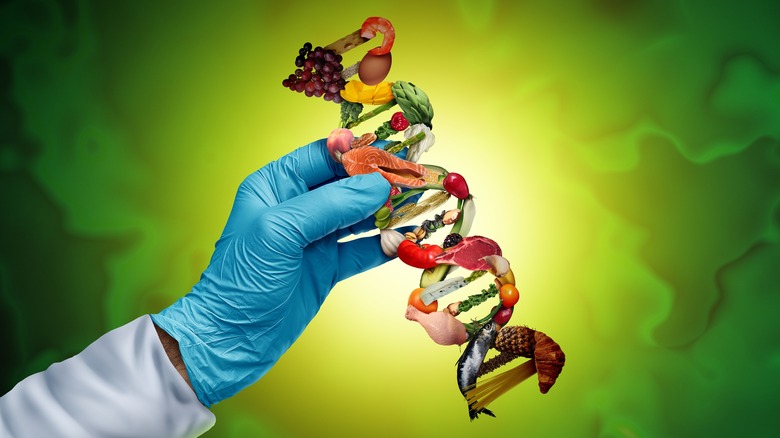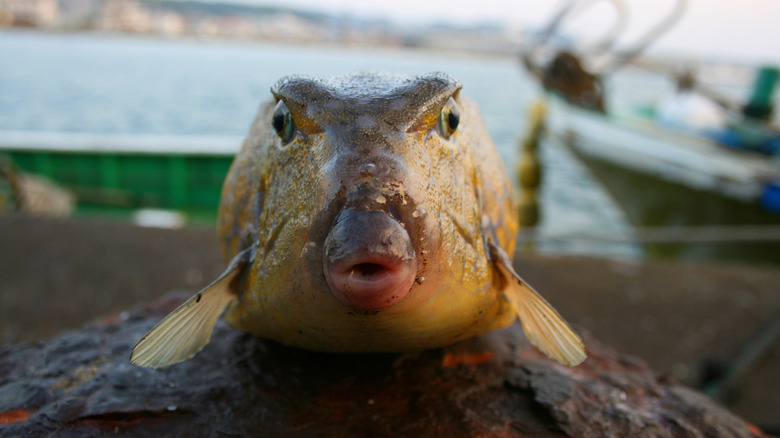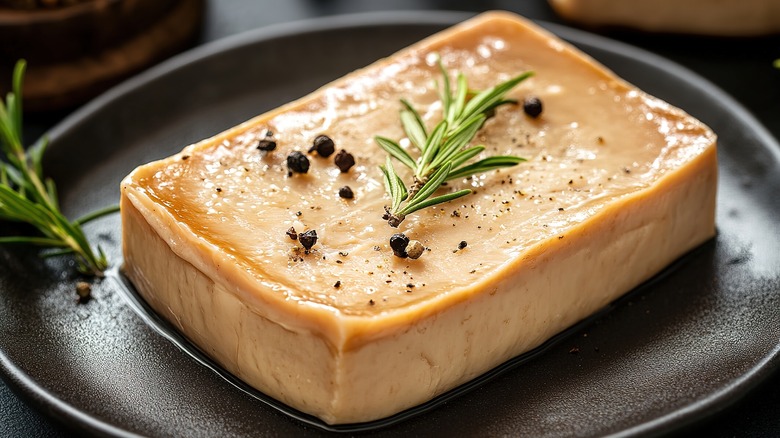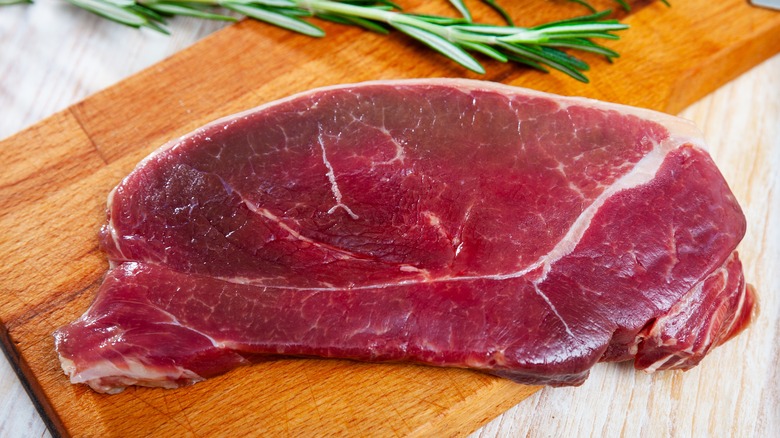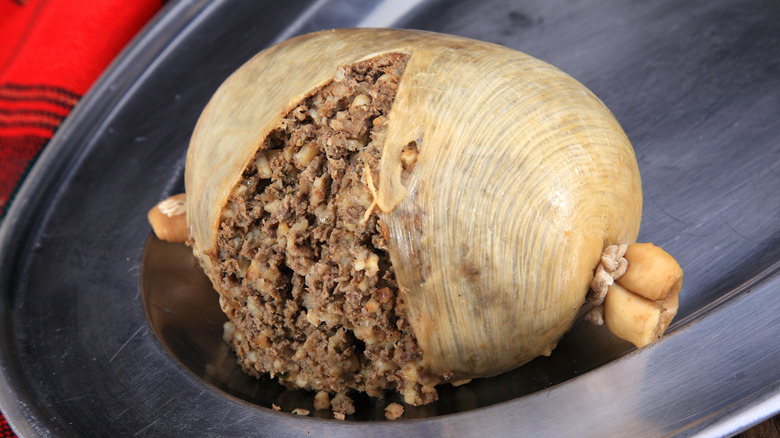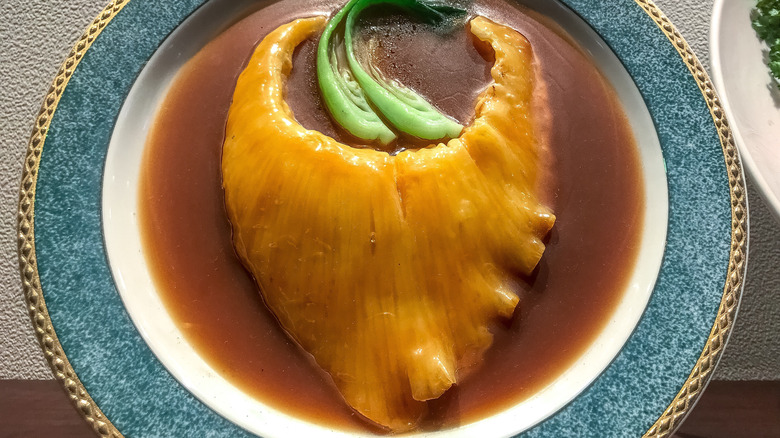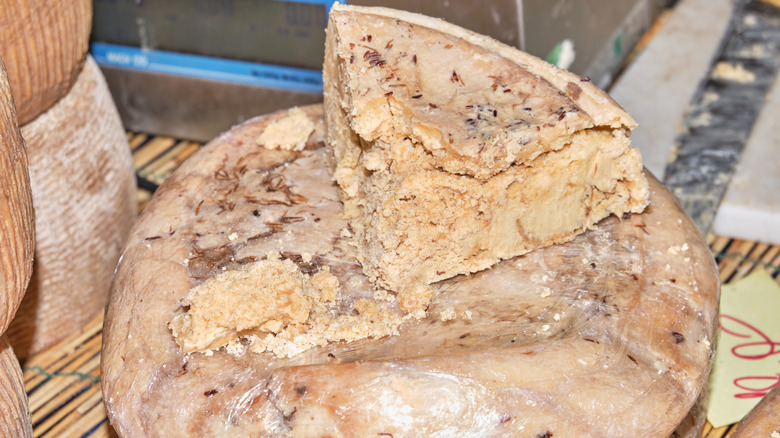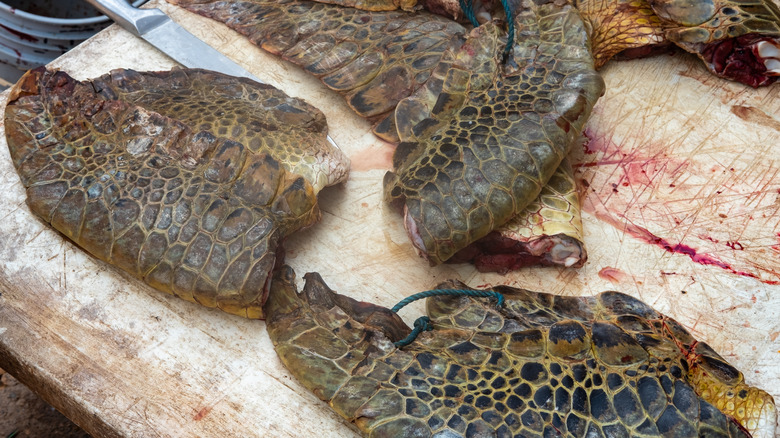The 12 Most Controversial Foods Banned All Over The World
Many animals, fruits, and byproducts of both are more than safe for consumption. In fact, it just makes sense to cook and enjoy them. However, there is actually quite a long list of controversial foods. While many people wouldn't even dream of eating most of them, some regions find them to be a delicious, rare delicacy. Whether it's because these items are officially banned, are sourced from endangered animals, require unsavory practices, or something else, the number of controversial foods may surprise you.
To discover some of the most controversial foods around the world I conducted extensive research on health, environmental, and culinary websites. While not everything I found made its way onto the list (sorry durian fruit, you didn't make the cut this time), each of the upcoming foods stands out as controversial in undeniable ways. Once you learn more about them, something tells me you'll think twice about consuming them if you ever encounter them at home or travel to a place where they are available, and I'm not talking about on the black market either. Keep reading to learn about some of the most controversial foods banned all over the world so you can steer clear, or at least know exactly what you are getting yourself into if you decide to forgo the warnings.
Akee
It may be the national fruit of Jamaica, but akee is banned in the United States. How is it possible that this beloved Caribbean fruit is shunned? Well, as it turns out, it has the potential to be quite poisonous when unripe due to a chemical called hypoglycin A. Ripe akee is packed with fatty acids but the unripe fruit can be a source of poisonous chemicals that have been known to have detrimental effects like liver damage and death. Long story short, unripe akee is unsafe at best. Plus, it is illegal to bring akee fruit into the United States. So, while you don't need to avoid it entirely if you ever find yourself in Jamaica, you'll want to be 100% sure it is ripe before getting a taste.
Fortunately, knowing if akee fruit is ripe isn't a total guessing game. Once the fruit's rind naturally splits open to reveal edible arils with dark seeds it should be safe to eat. However, if the pale yellow arils are discolored, it is a sign that it is still poisonous.
No matter how you spell it (there are several variations), you won't find fresh akee in the United States. You may be able to find frozen, canned, or dried imports of the tropical fruit if your interest is piqued, but even that is fairly rare. I mean, have you ever seen it on your local grocery store's shelves? Probably not.
Raw milk
Interestingly enough, raw milk has become a hot topic on social media platforms like TikTok. Some influencers claim it is a healthier alternative to pasteurized milk because it is easier to digest and contains more vitamins and minerals. However, these claims are unfounded and downright misleading. In fact, while you are unlikely to hear about it on TikTok, the dangers of raw milk are undeniable.
Not only is there a tuberculosis risk associated with raw milk, according to the U.S. Food & Drug Administration (FDA), raw milk also carries "dangerous germs such as Salmonella, E. coli, Listeria, Campylobacter, and others that cause foodborne illness," (AKA food poisoning). The FDA goes on to say that raw milk is particularly dangerous for people with compromised immune systems, pregnant women, older adults, and children. So... not great. Actually, pretty scary.
With all this in mind, it isn't surprising that raw milk is banned in many countries, including Scotland, Australia, and Canada. It is also banned in 20 U.S. states and its sales are restricted in even more (via Healthline).
Kinder Surprise
Admittedly, Kinder Surprise may be one of the least "controversial" foods on this list, at least as far as production is concerned. However, it has proven to be enough of a threat that it is illegal in the United States. Sure, it is just a chocolate treat with a small toy inside, but, apparently, it poses quite a choking hazard. Since the FDA officially bans food "articles containing embedded, non-nutritive objects, being offered for sale in the United States" for exactly this reason, Kinder Surprise simply isn't allowed stateside.
Kinder Surprise is particularly threatening for overzealous children who gobble candy up without any hesitation, as is evidenced by several reported deaths over the years. As a result, you can only find Kinder Surprise on the shelves outside of the United States. Kinder wasn't going to let this stop the company though, so the brand made an alternative product to circumvent the ban: Kinder Joy. In the U.S., Kinder Joy is in many stores, and the only real change is that the toy is separate from the candy. It may be slightly different from the version found abroad, but it is essentially the same thing, so you don't really have to go without until your next trip overseas.
Bushmeat
Illegal trade in wild animal meat, AKA bushmeat, happens more than you may think. It might seem harmless to hunt wild animals and sell or trade their meat, but it actually poses several threats, both to biodiversity and public health as a whole.
Before we get into the details, let's be clear: Bushmeat encompasses quite a bit. It is a general term that refers to wild animal meat sourced from reptiles, mammals, birds, and amphibians whose natural habitat includes wetlands, jungles, and savannahs. You're probably thinking whoa, that's a lot and you're right. Anything from bat to wild boar to giraffe to snake to elephant is technically considered bushmeat. While not all seem super strange or dangerous (snake and boar aren't that out of the ordinary), unregulated bush meat poses a serious threat to overall health and safety.
In the United States, attempting to bring bushmeat into the country is illegal because it can contain diseases like Ebola that easily spread from animals to humans (via CDC). The CDC also notes that, "Generally, Ebola is not spread by food. However, in Africa human infections have been associated with hunting, butchering, and processing meat from infected animals." So, basically, you don't even have to eat bushmeat to experience adverse side effects. If you choose to forgo these warnings, they stress the importance of wearing gloves while handling bushmeat and thoroughly disinfecting any surfaces it comes in contact with.
Genetically modified foods (GMOs)
In the United States, genetically modified foods and crops are extremely common, even if cultivation is regulated in some areas. However, in many other parts of the world cultivating GMO crops is strictly banned or at the very least highly regulated.
According to the Genetic Literacy Project, "Biotech crops were planted in 26 countries, including 19 developing nations." Interestingly enough though, many of the countries that ban GMO cultivation allow importation of GMO crops to be used as livestock feed and more. Some even discriminate against some GMO crops and not others. For example, 19 members of the European Union voted to prohibit the growth of MON18, an insect-resistant variety of corn in late 2015. So, the acceptance and public opinion of biotech crops is somewhat inconsistent and convoluted depending on where you happen to be.
What does this all mean? Basically, GMOs are pretty controversial, even if they are super common worldwide. Whether this is based on actual scientific evidence or marketing is yet to be seen, but suffice it to say the debate rages on regarding the importance, safety, and benefits of GMO foods and crops.
Fugu AKA pufferfish
Fugu, or pufferfish, may be a delicacy in Japan, but poison that inherently exists in its organs makes it dangerous, as well. The FDA warns that fugu "may contain the potent and deadly toxins tetrodotoxin and/or saxitoxin which can cause severe illness and death. These are central nervous system toxins and are more deadly than cyanide." That is quite a scary warning. Even so, fugu is still seen as a high-end food that people have been known to seek out. Why bother if it is so risky? Compared to other white fish, fugu is less fatty. It also has more umami components, leading to a decadent, delicious taste.
If you want to enjoy fugu, it needs to be handled and prepared with abundant caution so as to avoid consuming the toxins within. This is serious, too — it's not like you can learn to do it at home. It requires a talented chef who executes careful, exacting skills and an extremely high level of attention to detail while preparing the unique fish. In fact, it can't be sold or served in the United States without a special license.
Foie gras
Foie gras is seen as a delicacy in some places (looking at you France), but once you know how it is created, you may never view it as such again. If you're asking yourself, isn't it just duck or goose liver? The answer is yes, but it's how the animals are treated and fed that leads to the super fatty liver meat we know as foie gras. Of course, arguments can be made for its rich, smooth texture and taste, but how it becomes that isn't for the weak of heart or stomach.
To create foie gras, young ducks or geese are force-fed in alarming amounts, most likely with feeding tubes inserted into their throats. This overeating leads to the birds' livers swelling to about eight times the natural size, possibly more. Unfortunately, these force-feeding methods commonly lead to infections and birds that are so heavy they can't even stand.
Some argue that the process used to create foie gras isn't that much worse than any other kind of meat, if at all. However, the fact that foie gras is illegal in some countries, like India, and banned from being produced in others says quite a bit about how people regard it. In the United States, California has successfully instituted a ban on the production and reselling of out-of-state foie gras. New York City also is attempting to ban foie gras, but so far, nothing is certain there.
Horse meat
Consuming horse meat may be legal in all but four U.S. states (Rhode Island, Massachusetts, Hawaii, and Delaware) but there isn't much of a market for it. In addition, there are laws surrounding the sale of horse meat for human consumption. Technically, you can still slaughter and consume your own horses in most states, it's just extremely unusual. Most people view horses as beautiful, highly intelligent animals great for many things, but eating them isn't one of them. In places like Mexico, Canada, Europe, and Asia, consuming horse meat is still a thing. It is even quite popular in some regions, just not in the United States.
Some supporters of using horse meat for human consumption prefer to call it chevaline, probably to distance the meat from the animal many of us love. However, don't let the rebranding fool you if you ever encounter chevaline on a menu abroad. There may actually be some benefits to consuming horse meat, like high levels of iron and omega-3 fatty acids, but, still, you wouldn't want to eat it without knowing, right?
While various bans on the slaughter of horses for human consumption have been introduced over the years, some argue it is actually bad for the horses. This sounds a bit counterintuitive, but apparently, older horses are more likely to be neglected, and designating them for slaughter prevents unnecessary abuse. Regardless of where you stand on the matter, eating horse meat is most certainly controversial in the United States.
Haggis
Haggis is proudly dubbed the national dish of Scotland. However, here in the United States, haggis is banned, and many of us have never heard of it or even know what it is made of. Interestingly, it was beloved by renowned T.V. personality, chef, and writer Anthony Bourdain, but we'll let you be the judge after you discover what it truly is.
Haggis starts with a base of finely diced sheep liver, heart, and lung. This combination is mixed with beef suet, onion, oatmeal, and spices, and stuffed into a sheep's stomach. Then, the entire "bag" is boiled. When properly cooked, you wind up with a meaty, oaty, crumbly dish that is both moist and crispy. You'd be hard-pressed to find anyone who says it looks appetizing at first sight, but many agree the taste is truly delicious.
So, why is importing haggis banned in the United States? Well, while it contains many ingredients, the ban is based on a single element: sheep lung. Since 1971, the USDA banned the sale of animal lungs as food, at least for humans (it is not off limits in animal food), because stomach contents have the potential to infiltrate them during slaughter. In addition, lungs are like filters, so they could contain a myriad of harsh environmental impurities. Even so, some people are pressuring the USDA to revoke the ban, so you may be able to get haggis in the United States sometime in the near future. Only time will tell.
Shark fins
Shark is actually one of the foods you should think twice about ordering from a fancy restaurant. You may be able to find it on the menu at some places, especially in Asia, but it is pretty controversial overall. It is also hard to know exactly where it came from. This poses two problems. First, a study conducted by Exposure & Health reports that shark meat has the potential to be dangerously high in mercury, especially in certain types like hammerheads. Second, shark fins are often harvested in a brutal way. The process is called finning, and it entails cutting fins off sharks and then simply tossing the animals back into the ocean where they will eventually die — and a slow death at that.
Eating shark meat is not illegal. However, in the United States, the sale, import, and export of shark fins is illegal. The United Kingdom and Canada also ban the shark fin trade. Even so, many countries do not ban the sale of shark fins, even if they are sourced in an illegal way because regulation is extremely difficult to enforce. So, while you may still be interested in tasting shark meat or fins, and you can get it at restaurants in the United States, who knows what path it took to get to your plate? Was it ethical? Is it one of the sharks that has an excessive amount of mercury? There is no way to know for sure.
Casu marzu
Dubbed the world's most dangerous cheese by Guinness World Records, casu marzu is a specialized cheese that comes from the small Italian island of Sardinia. There are many delicious, drool-worthy Italian cheeses, like mozzarella and Parmesan, but casu marzu isn't one of them. It does start with normal Pecorino Romano cheese, but that isn't where it ends, and it's the details that make all the difference here.
So, what makes casu marzu so different from the Pecorino Romano we all know and love? It is infested with Piophila casei, AKA skipper fly eggs. After the flies lay their eggs in the cracks of the cheese, maggots hatch — yes, you read that right. Then, the maggots eat their way through the cheese, making it softer and creamier along the way. Sounds gross, right? Well, Sardinians don't think so. In fact, they eat the whole lot and have been for centuries. It is even banned from commercial sale, but that doesn't stop them.
Aside from what most of us would consider an unsavory combination of maggots and cheese, casu marzu could also be damaging to human intestines, but proof of this is lacking. If you ever find yourself in Sardinia, you can likely find some casu marzu through a local vendor or boutique shop, but even if you do, are you willing to take the risk? Or, are you adventurous enough to give it a try, warnings be damned? Something tells me most people, myself included, would answer both questions with a resounding no.
Sea turtles
Most of us think of sea turtles as beautiful, gentle sea creatures that we wouldn't dare consume. As a highly protected, endangered species, not eating sea turtles seems like common sense to most people, but this wasn't always the case. It wasn't too long ago that turtle soup was pretty common. However, today, they are protected by the Endangered Species Act. As a result, eating them is completely off the table in the United States — pun intended. Regrettably, our over consumption of turtle meat is how they became endangered in the first place, so no longer doing so is the best way to preserve the species.
Although illegal in many places, sea turtle meat and eggs are still sold in some unregulated markets and places like the Cayman Islands, so they are not impossible to find. Still, you should probably stay far away if you ever encounter the option. Just think of those adorable surfer sea turtle babies in Finding Nemo and any semblance of temptations will fade anyway. Not to mention, eating sea turtles in the United States is a felony.
